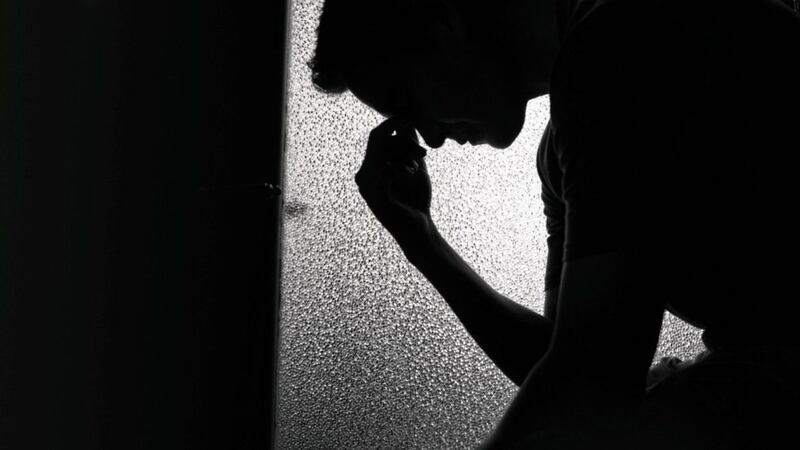CONOR MacNamara will never forget the moment he heard his friend Mark Quinn had taken his own life. It was 1994, a few days after Christmas, and the shocking news was relayed to him in a late-night telephone call.
Conor had only become friends with Mark in the final year at Red High, Downpatrick (St Patrick's Grammar) but he had never suspected Mark was struggling to cope. No-one did. A talented soccer player who had caught the attention of Norwich City, Mark was a popular, well respected pupil, described by pals as 'full of life'. His death by suicide was a devastating blow to all who knew him.
“I just couldn't take it in when I was told Mark was dead. Everyone in our year at school was devastated,” says Conor. “He was great fun, outgoing. I'd no idea things were so bad for him. No-one knew what had happened to make him want to do it.
“Back then, we never talked about mental health. Men kept these things to themselves. There was still a stigma around it.
“Mark never confided in me so the news of his death was a terrible shock. If you'd asked me at the time to name someone in our year who would have taken his own life, he would've been the last person I'd have thought of. There were no signs, none at all. None of us saw it coming.”
Conor, who comes from Newcastle but now lives and works in Dublin, knows only too well about the reluctance of young men to speak out about their problems. Unbeknown to his friends, including Mark, he too was struggling with depression. Until that final year in school, things had been going well for Conor. Academically he was doing well and he loved playing sport. But when personal issues got on top of him, his school work began to suffer too and he was plagued by dark thoughts.
“I was in the grip of a terrible depression,” says Conor. “I was given medication but didn't take it. I'd had extreme anxiety from childhood but I didn't have bad depression until my late teens. I was particularly bad over the winter months.
“I was housebound for a while and I must admit, I did think about taking my own life. But I never talked to anyone about it. You didn't back then. I always thought people would accuse me of just looking for attention. It's hard for young men to open up and talk about these things but it doesn't have to be.”
Conor (42) left Red High after his A-levels and went on to study in Dublin, gaining a masters degree. He worked in professional services for a while, where he endured workplace bullying. His weight ballooned and his depression returned so in 2011 he went through a "mid-life crisis" and decided to take up cycling.
This wasn't ordinary cycling though; the type of person who likes to set himself a tough challenge, Conor decided to hit the Alps and the Pyrenees and started to train obsessively for the mountain climbs. The aim was to undertake 60 and to write a book, documenting the climbs. But then panic set in.
“I thought doing the climbs would be good for me, that they would give me a sense of achievement and help me to face my fears. I had an extreme fear of heights.” Conor says.
“But the pressure I was putting myself under was tearing me apart. I spent four years at 10 stone trying to stay as lean as possible for the climbs and I would stress myself out watching video footage of the climbs that had very high drops.
“When I was up high in the French Alps last year, I had several severe panic attacks but thought at the time it was dehydration. There was a tightness in my chest and I found it hard to breathe. I was shaking all over. I didn't realise at the time that I had an extreme anxiety disorder.”
Then last year Conor suffered a breakdown. He'd been training hard for his cycling trips, getting up at 4am and riding 120kms over mountains every Saturday. As he'd committed to writing the book, he felt he couldn't back out. Despite feeling uneasy and increasingly anxious, he pushed himself to hit the Alps at the end of June, where he had his most severe panic attack. His life fell apart after that.
“It think it was four years of stress building up,” he says. “I just collapsed. I remember going to see my doctor, thinking he was going to tell me there was something wrong with my heart and lungs. Then he told me I had a severe panic disorder.
“I thought I'd had a fear of heights and dehydration all those times I felt unwell. To do 60 climbs of these on the bike with an untreated panic disorder is a hard thing to do.”
Conor's mental health deteriorated to the point where he again contemplated taking his own life, thoughts of leaving his wife Anne and his dad behind to pick up the pieces preventing him from doing so. But when he reached out for help, it was available. His GP prescribed medication, which he agreed to take this time, and gradually he began to feel better.
It was around this time Conor, who works with his father in his engineering business, started to think about his old school pal Mark and what could be done to commemorate his legacy in the run-up to his 25th anniversary.
Given what he had gone through himself, he wanted to raise funds for Ballynahinch Counselling Service while encouraging young men in the Co Down area affected by anxiety and depression to seek help before it was too late.
Conor reached out to former pupils from his year at Red High, the school itself and Mark's family. He then set up a whatsapp group, which currently has around 50 members, and mooted the idea of fundraising in Mark's name.
Everyone he spoke to was supportive and keen to help. In less than two months the group has managed to raise close to £3,000 and the aim is to raise £10,000 for the counselling service. The first Saturday of December has been set aside for a series of fundraising events in Ballynahinch and all proceeds from the sale of Conor's book will be included in the overall target.
“Everyone who knew Mark loved him,” Conor says. “We want to remember him, in this his 25th anniversary, but also help young men struggling with mental health problems. The help and support from a lot of the lads has been unbelievable.
“Men find it so difficult to go for help about these things and in rural areas especially, there's still a stigma. That needs to end.”
Conor's own experience helped in his understanding of the need to talk, he says, adding: “When I spoke to other friends from Red High and told them about my own breakdown, I was amazed to hear just how many others had suffered with their own issues.
“It's important to get a conversation going and help other men. We need them to speak out and not leave it until it's too late. It’s my choice to be open about it. If some people think I’m weird for talking about it that’s their issue.
“My breakdown was horrendous and I don't want anyone else to go through the same thing. People keep telling me I’m great for doing all this but I’m not. I’m just doing what I want to do with my life which is trying to help other people from not going through some of the ordeals that I went through.
"By remembering Mark and raising awareness about mental health, hopefully we might be able to save at least one person.
“No matter how bad things are, they can get better... The help is out there; we just need to ask for it. Life can be good again.”
:: For more see twitter.com/RedHigh25. If you would like to talk about any of the issues raised in this article Samaritans can be reached by calling 116113 or emailing jo@samaritans.org








